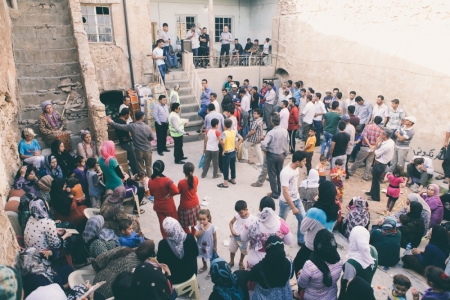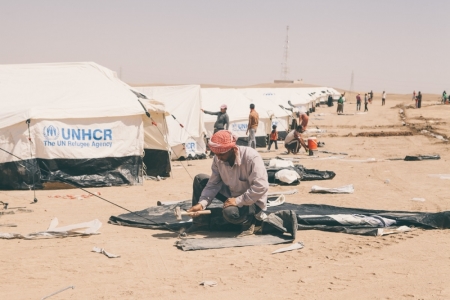Iraq May Break Into Three Separate States in Response to Islamic Attacks, Kurdish Official Predicts

Iraq could break apart into three separate states in response to the extremist Islamic group ISIS, which declared an "Islamic state" in Iraq and Syria, a Kurdish government official predicts.
"Baghdad seems to be pushing us into that direction, and we're closer than ever," said Karim Sanjari, minister of Interior for the Kurdish region, according to Christian relief group World Compassion Terry Law Ministries.
Jason Law, vice president of Operations for World Compassion, told The Christian Post in a phone interview on Thursday that Iraq splitting up into Shia, Sunni and Kurdish states is very much a real possibility.
"In my personal opinion, I think that is the only solution. Out of the people I have spoken with, that seems to be kind of the consensus. Everyone believes this is the only solution," Law told CP.
"There needs to be a Shia, Sunni and a Kurdish state. Kurdistan is already more developed along those lines than anybody, and I think they are definitely moving forward toward declaring independence," he continued.
"I think that's the answer, and I think we're seeing those lines being drawn now. It's unfortunate that it's taking war to do that, but I do believe that's the solution."
Law said that thousands of refugees fleeing Mosul and other regions in Iraq being targeted by ISIS are now living in refugee camps in the autonomous region of Kurdistan. Along with refugees from the ongoing Syrian civil war, there are as many as 750,000 people who need help with all sorts of necessities in the camps.
World Compassion is providing assistance at the refugee camps, coming and finding the items that families need, such as toiletry items, kitchen supply items, baby formula, shoes, and various other things.
"It's a very difficult, very tough situation, especially with the time of the year it is happening. The heat is tremendous. We were there at 10 a.m. in the morning – when we arrived at camp it was over 100 degrees, and they expected it to get up to 120-125 degrees that day. It's literally right off the highway coming off Mosul up north, in the desert. So they really are just out in the field," Law told CP about his trip to Kurdistan in June.
The heavy weight of taking care of so many refugees is falling on the shoulders of the Kurdistan government, which has greatly welcomed help from World Compassion and other humanitarian organizations.
"[Sanjari] is super appreciative, very honoring and inviting for organizations like ours. He really believes that it's the smaller NGOs that make the bigger difference. Some of the bigger ones, they move really slow, they can respond to an immediate crisis, but then the ongoing support can be little bit difficult," Law said.
"He knows that we are a Christian organization, and our agenda is that we want to share the love of Christ with people. He's a Muslim man, but he's open to that because I genuinely believe they want to see a place where there could be a true democracy, and hopefully one day freedom of religion."
Law said that the impact on the Kurdish regional government has been "tremendous," because even before the breakout of the ISIS militants, it had faced cuts in its funding from the central government in Baghdad.
With the influx of refugees, the need to provide infrastructure, electricity and water has put a strain on the people themselves.

The United Nations reported on Friday that at least 5,576 Iraqi civilians have been killed this year alone in violent attacks, while more than 1.2 million people have been displaced.
"ISIL and associated armed groups have … carried out many of these attacks in a systematic manner heedless of the impact on civilians, or have systematically targeted civilians and civilian infrastructure with the intention of killing and wounding as many civilians as possible," the report, compiled by the U.N. Assistance Mission for Iraq and the U.N. Human Rights office, stated.
"Targets have included markets, restaurants, shops, cafes, playgrounds, schools, places of worship and other public spaces where civilians gather in large numbers."
The militants, which have also been active in Syria, have captured several cities in Iraq, including Mosul and much of the Nineveh province.
In June, the militant group declared that an "Islamic state" has been established in Iraq and Syria, and vowed to take control over Baghdad as well.
Law explained that while Kurdistan has remained united and has managed to secure its territory from such attacks, there is tension due to the looming militant threat.
"Everybody is afraid of them. They are afraid of them, because of their radical take on Islam. We've seen some of the stories on the news – they've crucified people, [they've carried out] beheadings, they've tried to enforce a very strict Sharia law. So there is an element of fear because of the unknown. Even in Kurdistan, though it was safe and secure, there is definitely a sense of tension in the air, just because of the unknown," he said.
Law noted that it is difficult to predict what ISIS' next move will be, and whether it will be satisfied with Iraq splitting apart and with the possible formation of a Sunni state.
World Compassion, which has written about the situation at the refugee camps on its website, is seeking donations that will help it increase its relief efforts, which already provide food to 4,000 refugees each month.
"We come in with the love of Christ. For us, it's compassion ministry, but it's also evangelism. So we have to be careful with that, and be respectful of the local church there that we partner heavily with," Law said.
"Our aim is that we empower the local churches that we have been connected with there for many years now, and partner with them and train and equip them to conduct relief efforts in order to build relationships with these people. So it's not just relief, it's also mission-focused, but carefully and tactfully because of the nature of the environment."
Law added that the church can bring stability, hope and peace in such situations where people face instability, fear and hopelessness.
"I don't think we need to run from these situations as a church, I think we need to run to them, and my heart is to rally the church and rally the body of Christ, even along denominational lines," he continued.
"So let's respond and help meet the needs of these people, so they remember Jesus and they think of Christians when they think of the people who helped them when they were at their lowest place in life."
The World Compassion website offers various ways people can get involved to help the refugees.





















